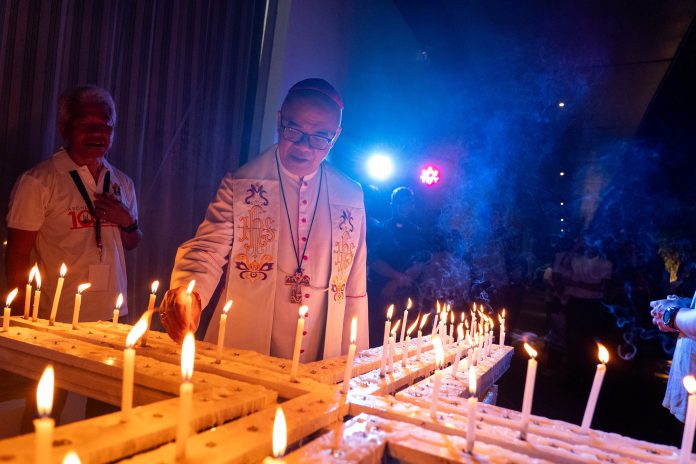Bishop Gerardo Alminaza of San Carlos, a red-tagged prelate known for his advocacy on peace and social justice, has been elected president of Caritas Philippines and chairperson of the Catholic Bishops’ Conference of the Philippines (CBCP) Episcopal Commission on Social Action, Justice, and Peace.
The announcement was made during the CBCP’s 130th Plenary Assembly in Anda, Bohol. Bishop Alminaza succeeds Bishop Jose Colin Bagaforo of Kidapawan.
Alminaza’s election places him at the helm of the Church’s national development and humanitarian arm, where he is expected to continue advancing programs on poverty reduction, ecological justice, peacebuilding, and human rights.
The bishop, who leads one of the most militarized dioceses in the country, has been subjected to red-tagging, most recently in February 2023 when he was publicly accused of communist links by former government officials Lorraine Badoy and Jeffrey Celiz on SMNI’s television program Laban Kasama ang Bayan.
“This is the first time I am publicly linked with the CPP-NPA and labeled as ‘demonic and diabolical,’” he told Bulatlat in an interview. “But I did not allow it to affect my mission in the diocese. I continue to do what I need to do. It even inspires me to do more.”
Despite threats, Bishop Alminaza said the red-tagging brought wider attention and support to his diocese’s mission.
“I am particularly touched by the courageous support of my brother bishops, our priests and pastoral workers, and cause-oriented and ecumenical groups and movements,” he said.
He acknowledged the serious risks of red-tagging, noting that others who had been similarly accused were later killed.
Despite this, he affirmed his resolve to continue his mission, grounded in his faith and commitment to Christ’s example of self-giving and solidarity with the oppressed.
“Sicut Christus vivit” — “As Christ lives” — is the bishop’s episcopal motto. “It signifies that our basis or standard for deciding or acting is not just what Jesus Christ did in the past, but as He—present in the midst of people who love each other—would do it,” Alminaza said.
That principle, he added, guides him to take a participatory approach to leadership, especially in accompanying the marginalized. “We value the perspectives, voices, and contributions of each one, even those who disagree with us.”
His work has drawn national and international solidarity. The Philippine Ecumenical Peace Platform warned that red-tagging the bishop “puts his life in danger,” while the International Coalition for Human Rights in the Philippines (ICHRP) praised his call for inclusive peace and urged protection for Church leaders under attack.
As vice president of Caritas Philippines prior to his new role, Bishop Alminaza welcomed the Supreme Court’s May 2024 ruling that recognized red-tagging as a threat to constitutional rights.
“This ruling offers a glimmer of hope and a chance for healing,” he said. “We urge those who have been red-tagged to seek support and know that they are not alone.”
In his diocese in Negros Occidental, Alminaza has consistently spoken against feudal land ownership, violence, and corruption.
“At the heart of our social problem in Negros is related to land… Political dynasties have private armies. There are indeed extra-judicial killings,” he said.
Quoting Fr. Niall O’Brien, he added: “Violence is the fruit of the tree of injustice. If we sow seeds of injustice, we reap violence.”
He called on the Church to guide communities in building inclusive and cohesive action grounded in Catholic Social Teaching. “Let’s journey together, ‘enlarging the space of our tent’ (Isaiah 54:2),” he said.
To fellow pastoral workers facing threats, he urged courage and perseverance, emphasizing the need to remain focused not on the dangers they face, but on the greater harm that could come to victims of injustice if their mission is abandoned.
As president of Caritas Philippines and chair of the CBCP social action body, Bishop Alminaza is expected to lead the Church’s response to deepening social inequality and democratic decline.
“We have only one life,” he said. “Let’s live it to the full in loving and serving God in our brothers and sisters—especially the most forsaken ones.”









